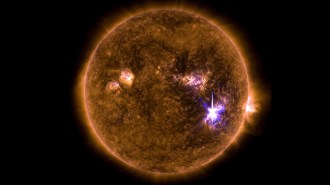Uncategorized
-
 Life
LifeWild bees add about $1.5 billion to yields for just six U.S. crops
Native bees help pollinate blueberries, cherries and other crops on commercial farms.
By Susan Milius -
 Archaeology
ArchaeologyA submerged Inca offering hints at Lake Titicaca’s sacred role
Divers found a stone box holding a figurine and a gold item, highlighting Lake Titicaca’s sacred status to the Inca.
By Bruce Bower -
 Life
LifeWater beetles can live on after being eaten and excreted by a frog
After being eaten by a frog, some water beetles can scurry through the digestive tract and emerge on the other side, alive and well.
-

Data visualizations turn numbers into a story
Editor in chief Nancy Shute writes about the power of using data visualizations in storytelling.
By Nancy Shute -
 Animals
AnimalsSome spiders may spin poisonous webs laced with neurotoxins
The sticky silk threads of spider webs may be hiding a toxic secret: potent neurotoxins that paralyze a spider’s prey.
-
 Health & Medicine
Health & MedicineHeavy drinking drove hundreds of thousands of Americans to early graves
From 2011 to 2015, more than 93,000 U.S. deaths per year could be tied to excessive alcohol use, researchers say.
-
 Health & Medicine
Health & MedicineHydroxychloroquine can’t stop COVID-19. It’s time to move on, scientists say
Hydroxychloroquine doesn’t work as antiviral or a treatment for COVID-19, an abundance of scientific data suggest.
-
 Health & Medicine
Health & MedicineCoronavirus outbreak at a Georgia overnight camp infected over 200 kids and staff
A report documenting a COVID-19 outbreak in Georgia hints that children might play a key role in spreading the virus.
-
 Health & Medicine
Health & MedicineHuman sperm don’t swim the way that anyone had thought
High-speed 3-D microscopy and mathematical analyses reveal that rolling and lopsided tail flicks keep the cells swimming in a straight line.
By Jack J. Lee -
 Ecosystems
EcosystemsTo save Appalachia’s endangered mussels, scientists hatched a bold plan
Biologists have just begun to learn whether their bold plan worked to save the golden riffleshell, a freshwater mussel teetering on the brink of extinction.
-
 Plants
PlantsThis parasitic plant consists of just flashy flowers and creepy suckers
With only four known species, Langsdorffia are thieves stripped down to their essentials.
By Susan Milius -
 Physics
PhysicsThe physics of solar flares could help scientists predict imminent outbursts
Physicists aim to improve space weather predictions by studying the physical processes that spark a solar flare.